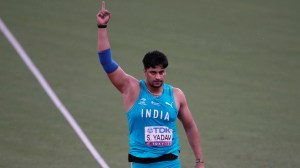NGOs can do without politics
Medha Patkar of Narmada fame has been arguing that the NGOs must contest the elections. Other NGOs have also made some experiments in this d...

Medha Patkar of Narmada fame has been arguing that the NGOs must contest the elections. Other NGOs have also made some experiments in this direction with, at best, lukewarm results. Now eminent jurist Rajindar Sachar has added his voice to the demand for selfless, idealist and people-rooted NGOs to come into politics and save the country from `scoundrels’ that infest the political parties. This argument does not sustain. One cannot fight an allegedly corrupt sangha (organaisation) — the political party — by relying on another equally suspect sangha — the NGOs. On he whole, the politician of this country is doing his job well. There is no guarantee whatsoever that the selfless NGOs will not become similar `scoundrels’ in power. Instead of joining this power game, the selfless must only educate the people and force the politicians to make correct policy decisions.
The basic problem is that any sangha is inherently suspect. One joins a sangha because a sangha begets power and fulfills his aspirations ofacquiring power. And, power has an inherent tendency to go berserk. It matters little whether the sangha is that of a political party, an NGO or even a religious institution.
It is difficult to rein in one corrupt organisation by establishing another one because the second is as suspect to degeneration as the former. This contradiction was resolved in our tradition by positing the concept of a brahmin (not to be confused with its degenerate birth-based existent version). The defining traits of a brahmin were pursuit of self-knowledge and aparigriha non-possession. Such a `selfless’ person might possibly not degenerate. Rooted in his inner self, having overcome his worldly selfishness, he alone may be expected to think about the society at large.
Thus it is said in Manu Smriti that "the Brahmin varna alone should be the one to subdue the Kshatriya varna." What should such a Brahmin be like? The less possessions he has the better he is: "One may have grain for three years or for one year, or for threedays, or not have for the next day. Now of these four Brahmins, the last in order is known to be better." And, how should he subdue the wicked king? "The Brahmin’s weapon is speech; with this let (him) slay his enemies."
The point is that one who has least possessions alone can be expected to stand up to the wicked politicians and he has to work with his words, not by building another sangha. Now the NGOs are inherently sanghas — non-governmental organisations. Therefore, it is difficult to believe that the NGOs will be able to discharge this role of subduing the Kshatriya.
We have thus two entirely different solutions to the problem of reining in the politicians in the service of the country. First is to build another set of sanghas NGOs with their paraphernalia of jeeps, computers, fixed deposits, and air tickets. These are as suspect as the political parties that they set out to subdue. The second alternative is to invigorate the tradition of aparigriha. Let the selfless give up their NGOs and turninto speakers of truth like Aurobindo.
A further difficulty with NGOs is that they have almost entirely become foreign-funded. Even government agencies like CAPART now rely on foreign funding. Foreign governments are providing the money to protect the human rights of the Indian people from the Indian state; to educate the Indian people about their rights under the 73rd amendment to the Indian constitution; to seek the right to information from the Indian government; and so on. Should foreign money now also be used to contest elections to the Indian parliament?
NGOs have a positive role to play. They are, truly speaking, extensions of the Indian state and that is what they must aim to excel in. They can improve the breeds of local cattle, teach rural folk to make smokeless chulhas, help them design better curriculum for the rural schools. All this can be done in full cooperation with the Indian government. To encourage NGOs to contest elections will be counterproductive because they will be distracted fromthe good work they are doing as extensions of the Indian state.
Photos



- 01
- 02
- 03
- 04
- 05




























